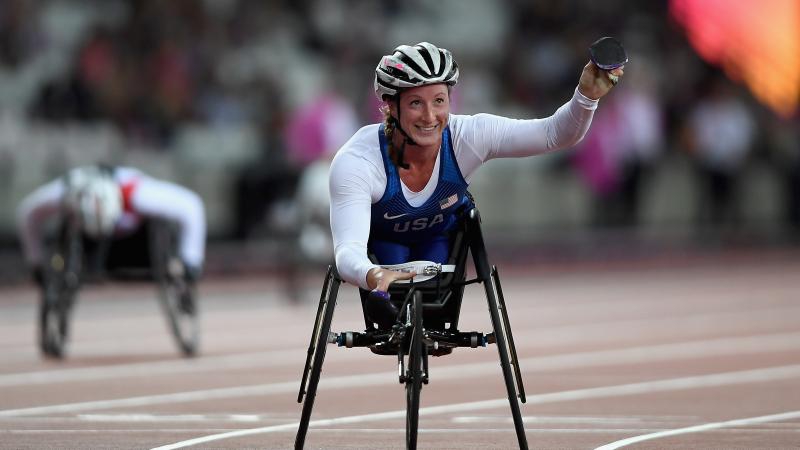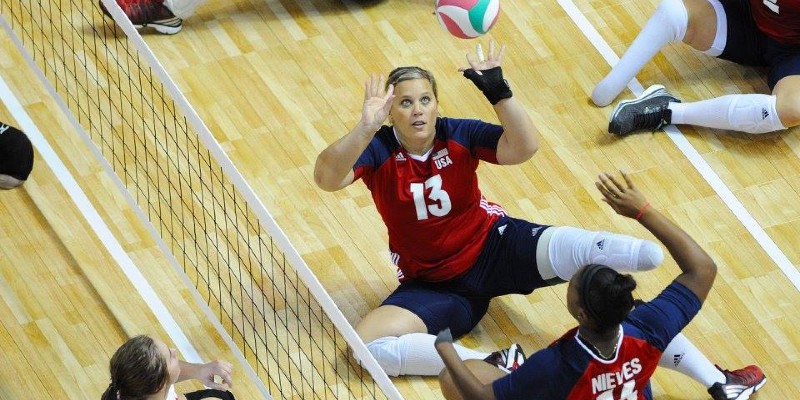*Editor’s Note: Shortly after publishing, Millage was asked to join the team in Toyko after a teammate was unable to make the trip. You can read more here.
Last week, 20 athletes — U of I students and alums — departed Champaign-Urbana for Tokyo for the 2020 Paralympic Games. For the first time since the 2008 games in Beijing, sitting volleyball player Nichole Millage was not among them. This year she fell just short of making the team, and was named an alternate. She’d planned to retire after the Tokyo games, and this was not exactly the exit she’d envisioned. However, after helping Team USA bring home two silver medals and finally a gold in Rio, she’s cemented a pretty stellar 16 year career in the sport.
I spoke with Millage about her experiences and the upcoming games.
She was first introduced to sitting volleyball at an Amputee Coalition of America conference in 2004. Having played volleyball as a Centennial High School student, the sport was a perfect fit. She attended her first training camp in 2005. “It was the hardest thing I’ve ever done,” said Millage. “It was very intimidating.” With encouragement from the other athletes, she stuck with it. The main training facility for the Team USA is at the University of Central Oklahoma in Edmond. In 2007, she made the decision to move there, finish her degree (and complete a master’s), and train full time. After winning silver in two straight Paralympic games, narrowly losing to China both times, Millage was ready to come home and settle in Champaign. She started her position with the City of Champaign and trained on her own, eventually making the Rio team that went on to finally win gold.
The gold medal inspired her to hang in for another four years, and when team selection came up for Tokyo, after the games were delayed a year, she was shocked to learn she wouldn’t be competing. She’d just come off of an international tournament in the Netherlands, where the team had won gold, and felt solid. “It definitely has been a very difficult month, just expressing disappointment, but also trying to still be happy for my teammates…then also during that time watching the Olympics. There are just a lot of emotions right now.”
Still, Millage is proud of her accomplishments. “I’m pretty proud of being a 44 year old that can still kick some butt on the team. I’m proud of myself for sticking through Tokyo. I’m proud of how far I got. I obviously wanted it to end in a different way.”
She was able to find some closure last month, as the team gathered for a final training camp before leaving for Tokyo. “I struggled at first, figuring out how I was going to do that…after having a week or so to reflect on things, I was like well, I have to go to my last camp. I have to have a proper ending with my team….It was the hardest thing I’ve ever done in my life, and it was also completely wonderful because my team celebrated my 16 year career. There were a lot of tears, but nobody makes me laugh and have as much fun as my team.”
Millage is ready to move forward — going on actual vacation with her vacation days, relaxing, and continuing to pour herself into the work she does for the city.
First, she’ll be tuning in to watch the games as they unfold next week, beginning August 24th. She is hoping that viewers will show the same excitement for these athletes as those that competed in the Olympics. If you’re here in C-U, there are so many athletes that live and train here to watch and cheer for throughout the week.
NBC is significantly increasing their coverage of the Paralympics this time, devoting more that 1200 hours throughout the course of the games. You’ll be able to watch highlights during prime time, just as you did during the Olympics, as well as catch events on NBCSN, online and through NBC Sports App, and on Peacock.
I feel like there’s already been a lot of good exposure on TV. I’ve seen so many commercials geared toward paralympics and paralympic athletes and it’s exciting to see all of that. I feel like more and more people are understanding what the Paralympics are, and who they’re for, and these athletes work just as hard and put just as much time in training, time, energy, and effort as Olympic athletes.
This will also be the first time that Paralympic medal winners will earn the same amount as Olympic medal winners.

U of I alum Tatyana McFadden. Photo from Paralympic.org.
So, what events should you check out next week, in addition to sitting volleyball and the slew of wheelchair racers from U of I? Millage has a few suggestions.
I know a lot of the wheelchair rugby guys. That’s a really fun sport to watch. There’s a documentary about it called Murderball. It’s quite a few years old now, but it gives you an idea of what the sport is like and how intense it is. I know a lot of the wheelchair basketball guys as well. All of our teams are in a good position to go out there and win gold. There are so many interesting sports. There’s goalball, which is inside of a gym and they’re trying to throw a ball into a net, but it’s all athletes that are vision-impaired. The ball makes noise, it has like a rattle inside of it.The gym has to be fairly quiet, and they’re trying to quietly throw the ball past the blind goalie.
You can read more about the U of I athletes here. Be sure to follow Disability Resources and Educational Services on Twitter for updates. The University of Illinois is an elite training ground for paralympians, wheelchair athletes in particular. Read a little about the storied history here.








